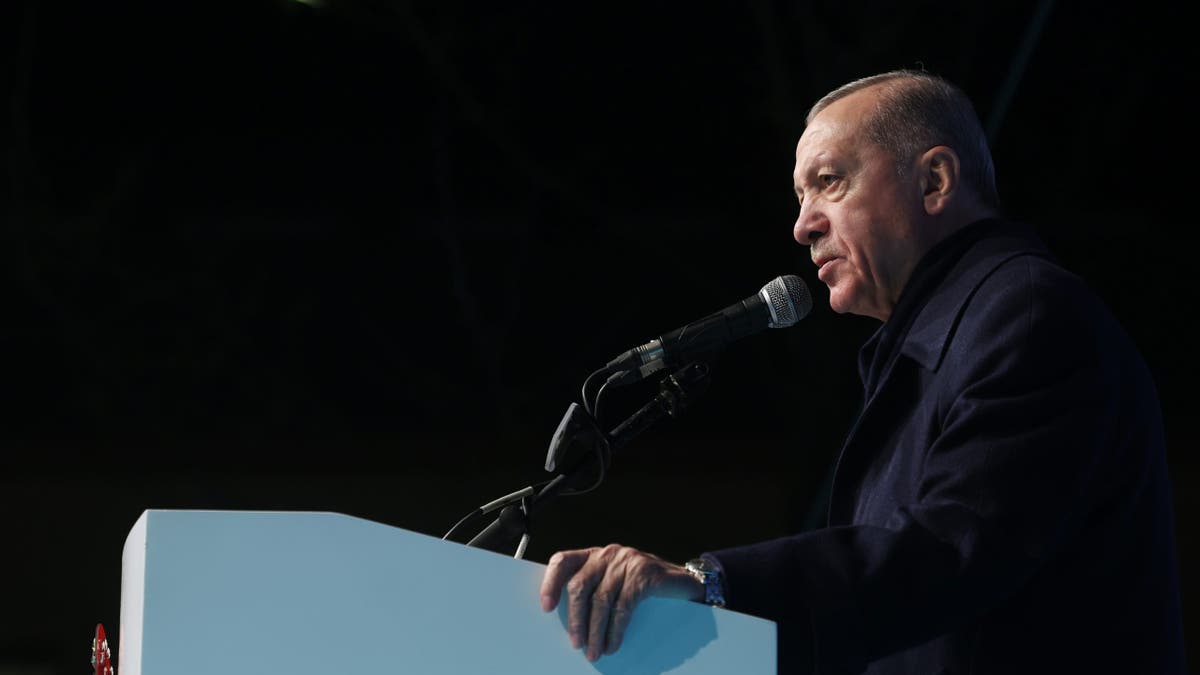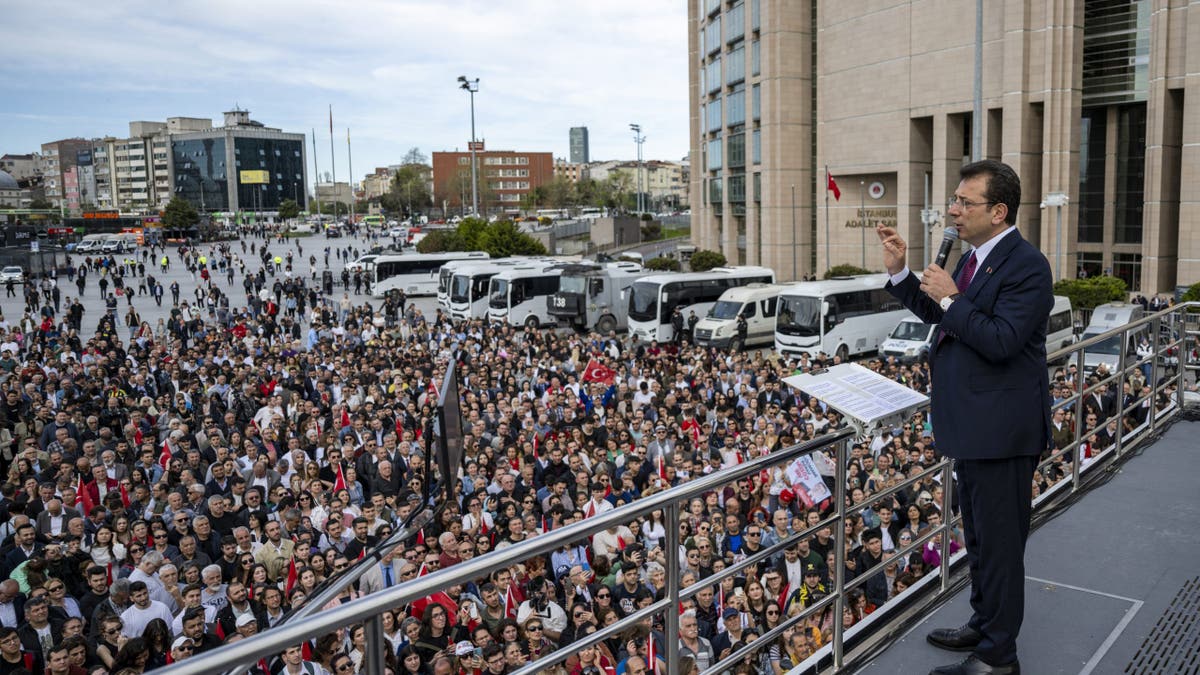The shocking losses for Turkish President Recep Tayyip Erdoğan’s party in the country’s local elections may serve as a preview for the next general election, but the effects in the short term will likely remain minimal, according to an expert.
“I think in the short run, nothing changes in Turkey because the election was not about the government, it was about local government,” Asli Aydintasbas, an associate senior policy fellow at the European Council on Foreign Relations, told Fox News Digital.
“The government gets to run the country still, but, in reality, you are seeing the emergence of the mayor of Istanbul, coming from a secular center-left opposition to Erdoğan in a race that very much felt like a race between Erdoğan and the mayor, which means you’re going to possibly have him run against Erdoğan in the next general election,” she added.
The Republican People’s Party (CHP) won the municipalities in nearly half of Turkey’s 81 provinces, with the party leader and Istanbul Mayor Ekrem Imamoglu winning re-election by a wide margin. The capital city Ankara’s Mayor Mansur Yavas, a CHP candidate, also won re-election with a 25-point lead over his challenger.
TURKEY AND ISRAEL ANNOUNCE TRADE BARRIERS ON EACH OTHER AS RELATIONS DETERIORATE OVER GAZA
The 37% nationwide support that CHP won is the greatest amount it won against Erdoğan’s Justice and Development Party (AKP) since he took power two decades ago, outperforming AKP’s 36% support for the first time ever. He had looked to re-establish influence over the municipalities of the country’s two largest cities but failed to make a dent as rampant inflation and economic woes continued to plague the country.

Turkish President Recep Tayyip Erdogan delivers a speech as he attends the Iftar (fasting meal) of the Turkish Youth and Education Foundation at Ibn Haldun University in Istanbul on April 5, 2024. (Mustafa Kamaci/Anadolu via Getty Images)
“I was expecting the opposition to win Istanbul in Ankara, for sure, for a combination of reasons, including record high inflation and the good performance of the current opposition mayors, but what I didn’t expect and what certainly no one expected was the kind of tsunami that this turned into: A major landslide in favor of the opposition, which [has] now outperformed Erdoğan’s AKP for the first time ever,” Aydintasbas said.
27 DEAD AFTER FIRE BREAKS OUT AT ISTANBUL NIGHTCLUB DURING RENOVATIONS
“You’re seeing the emergence of a younger, more energetic, secular opposition politician, and that whole scene is reminiscent of the rise of Erdoğan: different political landscape, different political tradition,” she explained. “But the truth is that Istanbul is so important and such a huge city that if you win Istanbul, it means you have a good chance in national politics.”

Istanbul Mayor Ekrem Imamoglu of the main center-left opposition Republican People’s Party receives an official mandate to serve five more years in Istanbul on April 3, 2024. (Yasin Akgul/AFP via Getty Images)
The double mayoral wins for CHP shattered Erdoğan and AKP’s seeming stranglehold on the country, and the issues that emerged throughout the COVID-19 pandemic seemed to further erode that strong position, leading many to believe Erdoğan would lose the 2023 general election.
TURKEY DENIES PRO-KURDISH MAYOR-ELECT THE RIGHT TO ASSUME OFFICE
Instead, Erdoğan came out ahead in a very tightly contested race with 52% of the vote compared to 48% for his opponent, Kemal Kılıçdaroğlu, formerly the leader of CHP. Erdoğan declared that “the only winner today is Turkey.”

Istanbul Mayor Ekrem Imamoglu of the main center-left opposition Republican People’s Party receives an official mandate to serve five more years in Istanbul on April 3, 2024. Ekrem Imamoglu’s second victory in an Istanbul city election on March 31 cemented his standing as Turkey’s top opposition leader in a new blow to President Recep Tayyip Erdogan and his ruling party. (Yasin Akgul/AFP via Getty Images)
However, the most recent losses indicate that Erdoğan cannot rest easy and that his close call was more of a portend than a speed bump, most importantly because the support has come from across the country. Turkey, like many countries, has witnessed a sharp divide between cities and other areas when it comes to political ideology and voting, but that divide has rapidly vanished over the past few years.
“Definitely from a sociological perspective, this is new because for the longest time, Turkish opposition was only able to get the votes of secularist urban professionals … those that wanted a modern lifestyle, a westernized lifestyle and could not make an agreement within the large conservative mosques in cities or in the countryside,” Aydintasbas said. “Now you are seeing that in huge cities.”
CLICK HERE TO GET THE FOX NEWS APP
“Turkey’s a very urbanized country in big cities, the secular versus the big religious divide is no longer as relevant,” she continued. “You are getting conservatives and Kurds from big cities voting for the opposition, and I think that is really significant, and … people from Erdoğan’s conservative base who for different reasons, including economic mismanagement, who decided to give the opposition of try.”
(this story has not been edited by TSA Mag staff and is published from a syndicated feed.)
The shocking losses for Turkish President Recep Tayyip Erdoğan’s party in the country’s local elections may serve as a preview for the next general election, but the effects in the short term will likely remain minimal, according to an expert.
“I think in the short run, nothing changes in Turkey because the election was not about the government, it was about local government,” Asli Aydintasbas, an associate senior policy fellow at the European Council on Foreign Relations, told Fox News Digital.
“The government gets to run the country still, but, in reality, you are seeing the emergence of the mayor of Istanbul, coming from a secular center-left opposition to Erdoğan in a race that very much felt like a race between Erdoğan and the mayor, which means you’re going to possibly have him run against Erdoğan in the next general election,” she added.
The Republican People’s Party (CHP) won the municipalities in nearly half of Turkey’s 81 provinces, with the party leader and Istanbul Mayor Ekrem Imamoglu winning re-election by a wide margin. The capital city Ankara’s Mayor Mansur Yavas, a CHP candidate, also won re-election with a 25-point lead over his challenger.
TURKEY AND ISRAEL ANNOUNCE TRADE BARRIERS ON EACH OTHER AS RELATIONS DETERIORATE OVER GAZA
The 37% nationwide support that CHP won is the greatest amount it won against Erdoğan’s Justice and Development Party (AKP) since he took power two decades ago, outperforming AKP’s 36% support for the first time ever. He had looked to re-establish influence over the municipalities of the country’s two largest cities but failed to make a dent as rampant inflation and economic woes continued to plague the country.

Turkish President Recep Tayyip Erdogan delivers a speech as he attends the Iftar (fasting meal) of the Turkish Youth and Education Foundation at Ibn Haldun University in Istanbul on April 5, 2024. (Mustafa Kamaci/Anadolu via Getty Images)
“I was expecting the opposition to win Istanbul in Ankara, for sure, for a combination of reasons, including record high inflation and the good performance of the current opposition mayors, but what I didn’t expect and what certainly no one expected was the kind of tsunami that this turned into: A major landslide in favor of the opposition, which [has] now outperformed Erdoğan’s AKP for the first time ever,” Aydintasbas said.
27 DEAD AFTER FIRE BREAKS OUT AT ISTANBUL NIGHTCLUB DURING RENOVATIONS
“You’re seeing the emergence of a younger, more energetic, secular opposition politician, and that whole scene is reminiscent of the rise of Erdoğan: different political landscape, different political tradition,” she explained. “But the truth is that Istanbul is so important and such a huge city that if you win Istanbul, it means you have a good chance in national politics.”

Istanbul Mayor Ekrem Imamoglu of the main center-left opposition Republican People’s Party receives an official mandate to serve five more years in Istanbul on April 3, 2024. (Yasin Akgul/AFP via Getty Images)
The double mayoral wins for CHP shattered Erdoğan and AKP’s seeming stranglehold on the country, and the issues that emerged throughout the COVID-19 pandemic seemed to further erode that strong position, leading many to believe Erdoğan would lose the 2023 general election.
TURKEY DENIES PRO-KURDISH MAYOR-ELECT THE RIGHT TO ASSUME OFFICE
Instead, Erdoğan came out ahead in a very tightly contested race with 52% of the vote compared to 48% for his opponent, Kemal Kılıçdaroğlu, formerly the leader of CHP. Erdoğan declared that “the only winner today is Turkey.”

Istanbul Mayor Ekrem Imamoglu of the main center-left opposition Republican People’s Party receives an official mandate to serve five more years in Istanbul on April 3, 2024. Ekrem Imamoglu’s second victory in an Istanbul city election on March 31 cemented his standing as Turkey’s top opposition leader in a new blow to President Recep Tayyip Erdogan and his ruling party. (Yasin Akgul/AFP via Getty Images)
However, the most recent losses indicate that Erdoğan cannot rest easy and that his close call was more of a portend than a speed bump, most importantly because the support has come from across the country. Turkey, like many countries, has witnessed a sharp divide between cities and other areas when it comes to political ideology and voting, but that divide has rapidly vanished over the past few years.
“Definitely from a sociological perspective, this is new because for the longest time, Turkish opposition was only able to get the votes of secularist urban professionals … those that wanted a modern lifestyle, a westernized lifestyle and could not make an agreement within the large conservative mosques in cities or in the countryside,” Aydintasbas said. “Now you are seeing that in huge cities.”
CLICK HERE TO GET THE FOX NEWS APP
“Turkey’s a very urbanized country in big cities, the secular versus the big religious divide is no longer as relevant,” she continued. “You are getting conservatives and Kurds from big cities voting for the opposition, and I think that is really significant, and … people from Erdoğan’s conservative base who for different reasons, including economic mismanagement, who decided to give the opposition of try.”
















